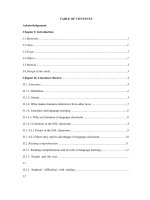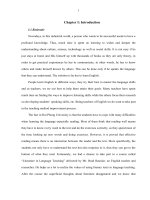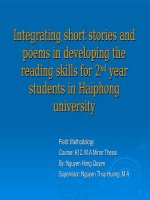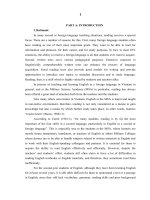Integrating short stories and poems in developing the reading skills for 2nd year students in haiphong university part 6
Bạn đang xem bản rút gọn của tài liệu. Xem và tải ngay bản đầy đủ của tài liệu tại đây (58.75 KB, 3 trang )
Appendix
Survey questionnaires for students at HPU
Questionnaire N
o
1
Questionnaires on the students’ attitude toward literary texts
1. Rank the following genres of literature according to your preference and
give the reason why:
a. novel
b. short story
c. poetry
d. drama
2. Which of the following aspects often cause difficulties when reading
literature?
a. unfamiliar vocabulary
b. cultural differences
c. literary styles and structure
d.
others……………………………………………………………………..
3. Which of the following topics are you most interested in? (you can choose
more than one)
a. personal relationship (love, friendship…)
b. people (heroes, famous people…)
c. nature and animal
d. social issues (crime, politic…)
e. mystery
f. others (give examples)
Thanks a lot for yours great assistance!
Questionnaire N
o
2
Questionnaires on the effects of short story and poem in
teaching reading comprehension.
1. Which of the followings do you find most difficult when reading short
stories and poems:
a. unclear theme b. vocabulary c. language
d. cultural background f. others……………
2. What do you often do when reading short stories and poems:
a. take notes b. look up new words c. just read to get the
plot
d. response to what the characters say and do e. others……………..
3. What do you think about the following activities when reading short stories
and poems. (you can choose more than one answer)
a. Guessing vocabulary in the context.
□ I find it a waste of time.
□ It helps us learn the words easier and remember them longer.
□ Others………………………………………………………………
b. Predicting plot of story or poem.
□ I find it of no use.
□ It is interesting and promotes our creativity.
□ Others………………………………………………………………
c. Answering comprehension questions.
□ It is boring and useless.
□ It takes time and of little use.
□ It makes us look back at the story or the poem to find the information,
so we can understand what we read more thoroughly.
□ Others………………………………………………………………
d. Skimming for idioms and expressions in the full sentences
□ It is useless, we can look them up in a dictionary
□ It is useful, we can learn them in the context, thus we can remember
them longer and understand their usage.
□ Others………………………………………………………………
e. Interpreting characters in the short story or figurative meanings in the
poem.
□ I think understanding the content is enough.
□ This activity is interesting, we can look at different features of the
event.
□ It is helpful, we can think in our own ways, we can be independent
from the text.
□ Others………………………………………………………………
f. The activities I like most in post – reading phase
□ creating the end of the poem or short story
□ changing the poem into a short story or a pop song
□ write diary about what I have read
□
others……………………………………………………………………
4. After reading I find…
a. my vocabulary is enlarged.
b. my reading speed is improved.
c. my guessing skill is better
d. my analyzing skills is improved.
e. I can answer comprehension questions quicker.
f. I can get to the bottom of the story and poem.
g. Others…
5. What are your suggestions that you think can help you read more
effectively:
□ The teacher should: ………………………………………………
□ The students should: ………………………………………………
Thanks a lot for yours great assistance!








